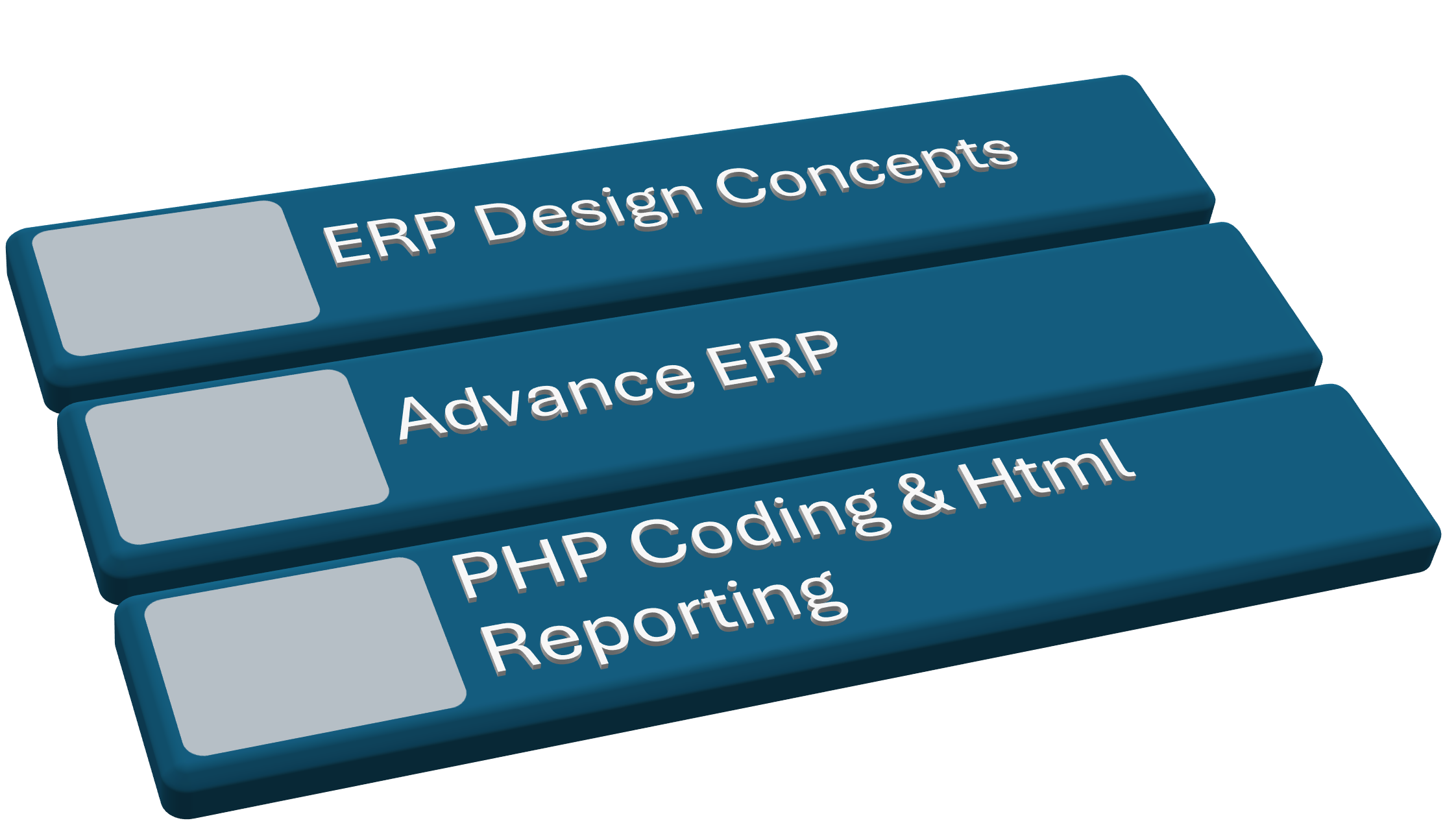Enterprise Resource Planning (ERP)
Module 1: Introduction to ERP Systems
- What is ERP?
- Definition, purpose, and benefits of ERP
- History and evolution of ERP systems
- Types of ERP software (on-premise, cloud-based, hybrid)
- ERP vs. Legacy Systems
- Key differences between ERP and traditional systems
- The need for ERP in modern business environments
- ERP Architecture
- Core components and layers of an ERP system
- Centralized vs. decentralized ERP
- ERP modules and their integration
- ERP Vendors and Market
- Leading ERP vendors (SAP, Oracle, Microsoft Dynamics, etc.)
- Selection criteria for ERP systems
Module 2: ERP Implementation Process
- Pre-Implementation Planning
- Understanding business requirements
- Defining the scope of the ERP project
- Project planning and resource allocation
- ERP Software Selection
- Choosing the right ERP solution
- Cost-benefit analysis of ERP options
- System Design and Customization
- Customization vs. configuration
- System design based on organizational needs
- Data Migration and Integration
- Data preparation and cleansing
- Integration with other enterprise systems (CRM, SCM, etc.)
- Testing and Deployment
- Testing the ERP system (unit testing, integration testing, user acceptance testing)
- Deployment strategies (phased, parallel, big bang)
- Post-Implementation Support
- ERP system maintenance
- User training and support
- Continuous improvement and upgrades
Module 3: ERP Functional Modules
- Finance and Accounting Module
- General Ledger, Accounts Payable/Receivable
- Fixed Assets Management
- Financial Reporting and Compliance
- Human Resource Management (HRM) Module
- Employee information management
- Payroll and Benefits administration
- Recruitment, training, and performance management
- Sales and Distribution (SD) Module
- Order management, pricing, and invoicing
- Shipping, delivery, and customer relationship management (CRM)
- Procurement and Supply Chain Management (SCM) Module
- Supplier management and procurement process
- Inventory management and warehousing
- Logistics and supply chain optimization
- Manufacturing and Production Module
- Production planning and scheduling
- Bill of Materials (BOM) and work orders
- Quality control and maintenance management
- Project Management Module
- Project planning, tracking, and resource allocation
- Cost tracking and financial control
- Customer Relationship Management (CRM) Module
- Customer data management
- Sales forecasting and marketing automation
- Business Intelligence (BI) Module
- Data analysis and reporting
- Dashboards and decision support systems
Module 4: ERP for Different Industries
- ERP in Manufacturing
- Industry-specific requirements and customization
- Lean manufacturing and ERP integration
- ERP in Retail and Distribution
- Inventory management, point of sale, and supply chain integration
- ERP in Services (Healthcare, Education, etc.)
- Tailored ERP applications for service industries
- Specialized workflows and data management
Module 5: ERP System Configuration
- Basic Configuration Settings
- Organizational structure setup
- User roles and permissions management
- Process Configuration
- Configuring core business processes (sales, procurement, finance)
- Customizing workflows and automation
- Reporting and Analytics Configuration
- Setting up reports, dashboards, and key performance indicators (KPIs)
- Business intelligence and data visualization tools
Module 6: ERP and Business Process Reengineering (BPR)
- Introduction to BPR
- The role of ERP in business process improvement
- Aligning ERP with business strategy
- Process Optimization with ERP
- Streamlining operations through ERP automation
- Best practices for process reengineering with ERP
- Challenges and Risks
- Overcoming resistance to change
- Managing process and organizational changes
Module 7: ERP Maintenance and Continuous Improvement
- System Updates and Upgrades
- Version management and patching
- Managing system upgrades and migrations
- Troubleshooting and Support
- ERP troubleshooting techniques
- Handling system errors and issues
- User Training and Support
- Developing training programs for end-users
- Knowledge management systems for ongoing support
Module 8: Future Trends in ERP
- Cloud ERP
- Benefits of cloud-based ERP systems
- Key considerations for adopting cloud ERP
- Artificial Intelligence and ERP
- Machine learning and predictive analytics in ERP
- Automating business decisions with AI
- IoT and ERP Integration
- Real-time data collection and monitoring via IoT
- Integration of IoT devices with ERP systems
- Mobile ERP
- ERP applications on mobile devices
- Mobile ERP functionality and challenges
- Blockchain and ERP
- Use of blockchain for data security and transparency in ERP systems
Module 9: Case Studies and Real-World Applications
- ERP Implementation Case Studies
- Success stories and lessons learned from major ERP implementations
- ERP Failures and Challenges
- Common reasons for ERP failures
- Risk mitigation strategies in ERP projects
- Industry-Specific ERP Examples
- Case studies of ERP systems in manufacturing, retail, healthcare, and more
Module 10: ERP Certification and Career Development
- ERP Certification
- Overview of ERP certification programs (e.g., SAP Certified, Oracle ERP Certification)
- Benefits of ERP certification for career advancement
- ERP Project Management
- Skills and knowledge required for managing ERP projects
- ERP consultant roles and career paths
Final Project / Capstone
- Practical Implementation Project
- Hands-on ERP implementation project, including all phases: planning, configuration, and deployment.
- Group projects or individual assignments to design an ERP system for a fictional company or real-world scenario.
